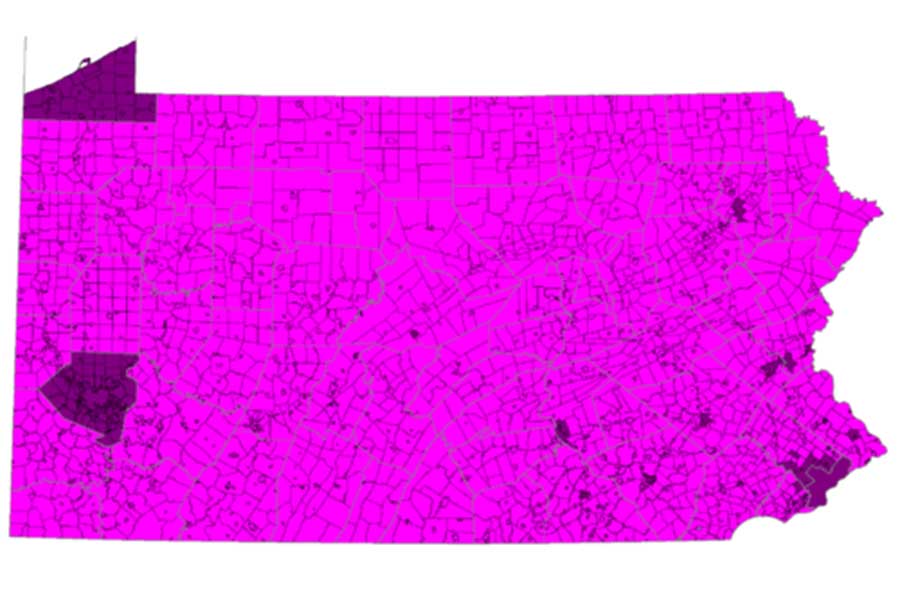Plymouth Township and Bridgeport Borough recently took steps to ensure civil-rights protections for their LGBT residents, visitors and workers.
On April 9, the Democratic-controlled Plymouth Township Council voted 5-0 to enact an LGBT-specific antibias ordinance. The ordinance bans anti-LGBT bias within the township in employment, housing and public accommodations.
“This ordinance provides an opportunity for people who might face discrimination to have some recourse,” said Vivian Lotz, a resident of the township for 32 years. “For that, I’m hugely grateful.”
Lotz, her spouse Renee Bess and other township residents have been urging council members to pass such an ordinance for at least the past year.
“It would be wonderful if we had [LGBT-specific] antidiscrimination laws on the state and federal level,” Lotz told PGN April 12. “But we don’t. In the meantime, this ordinance offer protections and ensures the rights of the LGBT community.”
Council President Marty Higgins said the ordinance should also attract residents and businesses to the township.
“People are lining up to try to move into Plymouth Township because of our excellent schools and above-average services,” Higgins said. “Let’s give them one more reason to want to move here.”
The ordinance also includes antibias protections on the basis of race, color, religious creed, ancestry, sex, national origin, handicap or disability, and the use of guide or support animals.
Additionally, the ordinance establishes a four-member Human Relations Commission that will mediate antibias complaints within the township. If mediation isn’t successful, a complainant can seek remedies in Montgomery County Common Pleas Court.
Township residents interested in serving on the HRC may submit an application to Karen Weiss, the township manager, at [email protected].
Weiss told PGN measure will take effect on May 10 after it’s advertised in a local newspaper.
Some 6,500 people live in Plymouth Township about 2 miles northwest of Philadelphia. The township is home to large retail establishments, Metroplex and the Plymouth Meeting Mall, among other businesses.
Two nearby municipalities — Whitemarsh Township and Conshohocken Borough — have similar LGBT-inclusive ordinances. All three towns comprise the Colonial School District, which has about 4,700 public-school students from kindergarten through grade 12.
“I think it’s nice to see that the three communities are now in agreement with nondiscrimination for the LGBT community,” said Plymouth Township council member David Gannon. “We’re three communities that are like-minded in a lot of things and we also share a school district.”
Gannon said the ordinance would not have passed last year, when Republicans controlled the council.
During the April 9 meeting, council member Lenore Bruno suggested that Montgomery County commissioners consider creating a county HRC to investigate antibias complaints.
But Kaitlyn Foti, a spokesperson for the commissioners, told PGN the county doesn’t have the legal authority to create such a body.
On April 10, Bridgeport Borough preliminarily approved a similar LGBT-specific antibias ordinance. The vote was 4-3, with council members William Lawless, Bill Lawless Jr. and Randy Bennett voting against. The three members did not respond to emails seeking comment for this story.
Bridgeport Borough is about 2 miles east of Plymouth Township and has about 4,500 residents.
After the Bridgeport ordinance is advertised in a local newspaper, it will come up for a final vote on April 24.
Bridgeport Mayor Mark E. Barbee, who is openly gay, said he expects the ordinance will be enacted on April 24 and that a local Human Relations Commission will begin operating within the next several weeks.
Municipal HRCs in Pennsylvania typically focus on private mediation to resolve antibias complaints. Most HRCs operate on a volunteer basis and no municipal funds are expended for them. If mediation isn’t successful, claimants may seek damages in court.
However, some larger cities such as Philadelphia and Pittsburgh have HRCs with staff that can order a variety of remedies for bias victims.
Bridgeport’s proposed ordinance gives the borough council an option of expanding its HRC powers, if necessary.
The expanded HRC powers would include the authority to issue subpoenas for witnesses and documents; hold a public hearing; issuing a cease-and-desist order to a discriminator; award damages for a bias victim; order a discriminator to pay a bias victim’s reasonable legal fees; and impose a fine of up to $10,000 on a discriminator.
The ordinances of Plymouth, Conshohocken and Whitemarsh don’t contain provisions to expand their respective HRC powers. Another difference among the four municipalities is that Conshohocken’s ordinance forbids anti-LGBT bias in “public education,” while the other ordinances don’t specify such protections.
State Sen. Daylin Leach, a Democrat whose district includes Bridgeport and Plymouth, told PGN a statewide LGBT-specific antibias ordinance is necessary.
“I think there is a need for a statewide LGBTQ antibias ordinance given the inconsistencies among different townships and municipalities,” Leach said in an April 13 email. “I would support a statewide law and think that it’s the best approach. But absent that, I do think that local ordinances are extremely important and certainly better than no protection at all.”
Thomas W. Ude Jr., legal and public policy director for Mazzoni Center, applauded Plymouth and Bridgeport for their actions on behalf of LGBT equity.
The laws “add to the growing number of similar local laws across the commonwealth, and give community members a place to address the discrimination they face,” Ude told PGN. “The ability to file a complaint locally makes those protections not only explicit, but also accessible.”
According to Equality Pennsylvania’s website, 45 state municipalities passed LGBT-specific antibias ordinances prior to Plymouth and Bridgeport. There are 2,562 municipalities in the state, but most of them have small populations. The state’s largest cities — including Pittsburgh, Philadelphia,
Allentown, Erie, Scranton and Lancaster — all have LGBT-specific antibias ordinances. Additionally, Erie County has an LGBT-specific antibias ordinance that encompasses 38 municipalities, and Allegheny County has one that includes130 municipalities.

